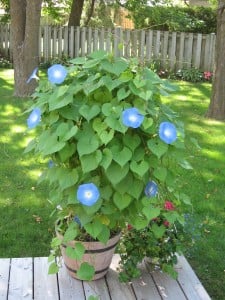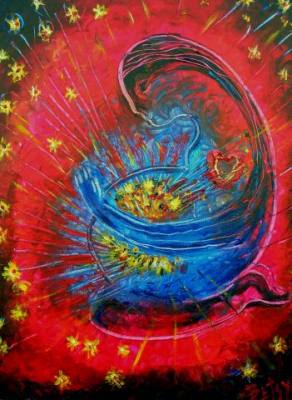 I’m sitting outside on my deck as I write this, listening to a noisy cardinal, and the squeals of delight from children in a neighbour’s pool. I’m also reading into the lectionary texts for these Summer Sundays, and I find myself almost (but not quite) wishing I could preach them all – but I’m thankful for a few weeks’ respite from the pulpit, and chance to simply enjoy reading the texts for their own sake.
I’m sitting outside on my deck as I write this, listening to a noisy cardinal, and the squeals of delight from children in a neighbour’s pool. I’m also reading into the lectionary texts for these Summer Sundays, and I find myself almost (but not quite) wishing I could preach them all – but I’m thankful for a few weeks’ respite from the pulpit, and chance to simply enjoy reading the texts for their own sake.
If you want to try doing the same, while you’re away on vacation, sitting on your own decks, or by a lake, or on a beach, here’s a link to a lectionary website where you can follow the sequence of texts for the July weeks we are in Sabbath mode.
http://lectionary.library.vanderbilt.edu/texts.php?id=270
Some of my own musings on some of the texts are below. Add your own questions and comments at the bottom of the page!
July 14 – Luke 10:25-37. The Good Samaritan.
Cedar Parkers will know we snuck this reading in early, on June 16, as the text for our celebration of the KidZone year. The children and some of their teachers did a wonderful dramatic presentation of the story – with Sami McLaren as the “Samaritan Woman(!), and Will Smith as a convincing ‘lawyer’ outsmarted by Jesus. The “aha!” from the dramatic presentation of this text for me was about how we get to love God and neighbour with our whole heart, mind, soul, strength; it looks like a stranger stopping to help out another stranger. Haven’t we seen that in spades in the last week or so, in places like High River, Calgary, Canmore, and closer to home, in Lac Mégantic? How might you be using your heart, mind, soul, strength to love neighbour (and stranger), during these summer weeks? I am certain you are!
July 21 -Luke 10:38-42 (Martha and Mary) and Genesis 18:1-12 (Entertaining Strangers at Mamre)
– News Flash! I am preaching at St John’s for this Sunday.
I am so glad I get to preach this week, because the Genesis reading is one of my favourites (I know, they’re all my favourites!). First, Luke. Very often we use the names of these two women who hosted Jesus at their home, as models for Christian women. Are you a Martha? (Practical, hospitable, doing the dishes while everyone else natters into the night?) Are you a Mary? (Serenely sitting at the feet of Christ, contemplating the mysteries of faith?) Does Martha get a bum rap in this story? Can we allow ourselves to be not a little ticked at Jesus for apparent ingratitude towards the apron clad Martha? All great questions. Here’s a few more….. Is this only a win-lose story, or are there other legitimate interpretations? Is this a story about focus or distraction? (Even the best Marthas, who begin so well by busily serving Jesus, can get worried, flustered and overwhelmed when the busyness takes over and causes us/them to lose sight of the reason why we’re busy serving Christ in the world in the first place. Isn’t that the story of the churches, in every age?!! What do you think?
As for the Genesis reading – Sarah laughed!! So would I if I were to overhear the strangers speaking to her husband while eating at her table. Her laughter is poignant, sad, perhaps embittered laughter at the incredible, outlandish, ridiculously stupid (to her) promises these strangers are making. Hers is the cynical laughter of one who cannot see a way forward against impossible odds, directed at those who can, and directed at God. Where do we see ourselves in this story? What impossible promises of God do we laugh at? Can we imagine God’s fidelity in the face of the real crises of our life? How might this story help us to rekindle faith. (Clue: read Genesis 21 and see what happens to Sarah’s laughter!).
Let me know what your questions are about this text, and they will help me prepare for my sermon for July 21.
Enjoy your Summer Sundays!
 A tough life he’s led,
partly by choice,
to be sure.
His daily companions, honey bees,
and a rude belching camel,
who, when she finally breathed her foul-mouthed last,
gave up her pelt to cover his back
through the icy chill of desert nights.
Oh yes, the desert freezes.
The sun beats down, baking to a crisp all day,
chapping lips and drying tears, and salting cheeks
so that the night frost can then bite to the marrow,
and chill the soul to a new awareness of mortality.
John is his name,
wildman his calling.
It’s no wonder,
given his birth to a silenced priest and a wise crone
both convinced by an angel that he was
formed awefully, fearfully in his mother’s womb
expressly to overthrow
the comfortable numbness of quietism,
to uproot hypocrisy with scorching speech as searing as the desert sun
and to foretell divine judgment with the icy candour of a desert moon.
John is his name
“Repent!” is his logo.
Prophet is his uniform:
mat-haired, stick-ribbed John.
Baptizer is his trade.
Waist deep in the rocky Jordan,
thrusting heads under brackish water,
clutching slick, newborn hands
grasping for air, for life,
all the while scanning the
desert sands for that narrowest of highways
upon which the sandalled feet of God’s Anointed
would trample
all injustice in his Advent.
©Elisabeth R. Jones, 2008, 2012
A tough life he’s led,
partly by choice,
to be sure.
His daily companions, honey bees,
and a rude belching camel,
who, when she finally breathed her foul-mouthed last,
gave up her pelt to cover his back
through the icy chill of desert nights.
Oh yes, the desert freezes.
The sun beats down, baking to a crisp all day,
chapping lips and drying tears, and salting cheeks
so that the night frost can then bite to the marrow,
and chill the soul to a new awareness of mortality.
John is his name,
wildman his calling.
It’s no wonder,
given his birth to a silenced priest and a wise crone
both convinced by an angel that he was
formed awefully, fearfully in his mother’s womb
expressly to overthrow
the comfortable numbness of quietism,
to uproot hypocrisy with scorching speech as searing as the desert sun
and to foretell divine judgment with the icy candour of a desert moon.
John is his name
“Repent!” is his logo.
Prophet is his uniform:
mat-haired, stick-ribbed John.
Baptizer is his trade.
Waist deep in the rocky Jordan,
thrusting heads under brackish water,
clutching slick, newborn hands
grasping for air, for life,
all the while scanning the
desert sands for that narrowest of highways
upon which the sandalled feet of God’s Anointed
would trample
all injustice in his Advent.
©Elisabeth R. Jones, 2008, 2012


![546229_384999778191553_192734606_n[1]](http://cpuc.edublogs.org/files/2013/08/546229_384999778191553_192734606_n1-1jp0atd.jpg)